<kernel v5.0>
Zoned Allocator -7- (Direct Compact)
Compaction
요청한 order 페이지에 대해 그 보다 많은 free 페이지가 있지만 그 페이지들이 파편화되어 높은 order 페이지 할당 요청에 대응하지 못하는 경우가 발생할 수 있다. 이러한 경우 사용중인 movable 페이지를 다른 곳으로 migration하여 연속된 free 페이지를 확보하는 방법을 compaction이라 한다.
- movable 페이지들은 사용자 영역에서 할당한 메모리나 file에 해당한다. 커널이 할당한 unmovable 페이지들은 compaction할 수 없다.
다음 그림은 order 2 페이지 할당 요청에 대해 compaction이 수행되는 모습을 보여준다.
migration
다음 그림과 같이 유저 공간에서 사용되는 migratble 페이지를 다른 물리 주소로 migrate(copy)하는 방법을 보여준다.
- migration 시 cpu가 페이지의 복사를 수행하지 않고 cpu cost를 낮추기 위해 DMA에 의해 복사를 수행하는 경우도 있다.
- migrate가 완료된 후 곧바로 가상 주소 공간에 매핑하지는 않는다. 추후 migrate된 페이지에 접근하는 경우 그 때 가상 주소는 변경 없이 물리 주소만 변경된 새로운 매핑이 맺어진다.
migratable 페이지
사용 중인 물리 페이지를 다른 물리 페이지로 옮길 수 있는 페이지이다. 다음과 같은 종류가 가능한다.
- lru movable 페이지
- LRU로 관리되는 movable 페이지는 커널 페이지 관리자가 직접 migration 가능한 페이지이다.
- non-lru movable 페이지
- LRU에서 관리되지 않는 페이지들은 기본적으로 migration이 불가능하다. 그러나 migration이 구현된 드라이버의 페이지들은 migration이 가능하고 이를 non-lru movable 페이지라고 한다.
- 예) zsram, balloon 메모리 드라이버
- LRU에서 관리되지 않는 페이지들은 기본적으로 migration이 불가능하다. 그러나 migration이 구현된 드라이버의 페이지들은 migration이 가능하고 이를 non-lru movable 페이지라고 한다.
free 스캐너 & migrate 스캐너
compaction이 진행되면 존 내에서 다음 두 개의 스캐너가 각 페이지 블럭을 스캐닝하기 시작한다.
- free 스캐너
- 최상위 페이지 블럭부터 아래 방향으로 free 페이지를 찾는다.
- migrate 스캐너
- 최하위 페이지 블럭부터 윗 방향으로 사용 중인 migratable 페이지를 찾는다.
다음 그림과 같이 migrate 스캐너가 찾은 사용 중인 migratable 페이지를 free 스캐너가 찾은 free 페이지로 migration 하는 과정을 볼 수 있다.
compact_priority
include/linux/compaction.h
/* * Determines how hard direct compaction should try to succeed. * Lower value means higher priority, analogically to reclaim priority. */
enum compact_priority {
COMPACT_PRIO_SYNC_FULL,
MIN_COMPACT_PRIORITY = COMPACT_PRIO_SYNC_FULL,
COMPACT_PRIO_SYNC_LIGHT,
MIN_COMPACT_COSTLY_PRIORITY = COMPACT_PRIO_SYNC_LIGHT,
DEF_COMPACT_PRIORITY = COMPACT_PRIO_SYNC_LIGHT,
COMPACT_PRIO_ASYNC,
INIT_COMPACT_PRIORITY = COMPACT_PRIO_ASYNC
};
compactin 시도 시 성공을 위한 3 단계 우선 순위이다.
- COMPACT_PRIO_SYNC_FULL(0) & MIN_COMPACT_PRIORITY
- 가장 높은 우선 순위로 compaction 및 migration이 full sync로 동작한다.
- COMPACT_PRIO_SYNC_LIGHT(1) & MIN_COMPACT_COSTLY_PRIORITY & DEF_COMPACT_PRIORITY
- 디폴트 및 중간 우선 순위로 compaction이 sync로 동작하지만 migration은 async로 동작한다.
- COMPACT_PRIO_ASYNC(2) & INIT_COMPACT_PRIORITY
- 초기 및 가장 낮은 우선 순위로 compaction 및 migration이 async로 동작한다.
migrate_mode
include/linux/migrate_mode.h
/* * MIGRATE_ASYNC means never block * MIGRATE_SYNC_LIGHT in the current implementation means to allow blocking * on most operations but not ->writepage as the potential stall time * is too significant * MIGRATE_SYNC will block when migrating pages */
enum migrate_mode {
MIGRATE_ASYNC,
MIGRATE_SYNC_LIGHT,
MIGRATE_SYNC,
MIGRATE_SYNC_NO_COPY
};
페이지를 migration할 때 사용하는 모드이다.
- MIGRATE_ASYNC
- 비동기 migration 모드로 동작하여 블러킹되지 않는다.
- async compaction 동작 시 사용된다.
- MIGRATE_SYNC_LIGHT
- writepage를 제외한 대부분을 동기 모드로 동작한다.
- kcompactd 에서 사용
- sync compaction 동작 시 사용된다.
- MIGRATE_SYNC
- 동기 migration 모드로 동작하여 블러킹된다.
- MIGRATE_SYNC_NO_COPY
- 동기 migration 모드로 동작하여 블러킹되지만, migration 페이지에 대해 cpu가 복사를 하지 않고 DMA를 활용하여 복사하게 한다.
Compaction 동작 모드
compaction은 다음과 같이 3가지 방법이 있다.
- direct-compaction
- order 만큼의 free 페이지 할당 요청 시 메모리 부족으로 인하여 해당 order의 할당이 어려울 때 compaction이 수행될 때 이를 페이지 할당 API 내부에서 직접 호출하는 방식이다.
- manual-compaction
- order와 관계없이 다음 명령을 통해 매뉴얼하게 요청한다.
- “echo 1 > /proc/sys/vm/compact_memory”
- order와 관계없이 다음 명령을 통해 매뉴얼하게 요청한다.
- kcompactd
- 메모리 부족 시 자동으로 wake되어 백그라운드에서 compaction을 수행한다.
Manual Compaction
다음과 같이 order별 페이지 상태를 확인해본다.
# cat /proc/pagetypeinfo Page block order: 10 Pages per block: 1024 Free pages count per migrate type at order 0 1 2 3 4 5 6 7 8 9 10 Node 0, zone DMA, type Unmovable 485 196 50044 12 5 0 0 1 1 1 0 Node 0, zone DMA, type Movable 22 69 66 51 46 30 21 11 8 1 386 Node 0, zone DMA, type Reclaimable 50 25 11 0 1 0 1 1 1 1 0 Node 0, zone DMA, type HighAtomic 0 0 0 0 0 0 0 0 0 0 0 Node 0, zone DMA, type CMA 1284 886 567 319 149 81 46 31 11 10 61 Node 0, zone DMA, type Isolate 0 0 0 0 0 0 0 0 0 0 0 Number of blocks type Unmovable Movable Reclaimable HighAtomic CMA Isolate Node 0, zone DMA 403 417 6 0 124 0
movable 페이지를 compaction 하기 위해 다음 명령을 통해 매뉴얼 compaction을 진행해본다.
echo 1 > /proc/sys/vm/compact_memory
다음과 같이 movable 페이지의 일부가 compaction이 된 결과를 확인할 수 있다. 다만 커널이 사용했었던 unmovable 페이지들은 compaction이 안되는 것을 확인할 수 있다.
# cat /proc/pagetypeinfo Page block order: 10 Pages per block: 1024 Free pages count per migrate type at order 0 1 2 3 4 5 6 7 8 9 10 Node 0, zone DMA, type Unmovable 489 196 50044 11 5 0 0 1 1 1 0 Node 0, zone DMA, type Movable 22 43 36 32 27 24 18 14 9 1 386 Node 0, zone DMA, type Reclaimable 69 26 11 0 1 0 1 1 1 1 0 Node 0, zone DMA, type HighAtomic 0 0 0 0 0 0 0 0 0 0 0 Node 0, zone DMA, type CMA 1189 814 521 292 134 75 42 30 12 9 63 Node 0, zone DMA, type Isolate 0 0 0 0 0 0 0 0 0 0 0 Number of blocks type Unmovable Movable Reclaimable HighAtomic CMA Isolate Node 0, zone DMA 403 417 6 0 124 0
kcomactd
메모리 부족 시 자동으로 wake되어 백그라운드에서 compaction을 수행하며 kernel v4.6-rc1에서 소개되었다.
- 참고
밸런싱 판단
high 워터마크 이상에서 요청한 2^order 페이지의 할당이 가능한 상태인지 여부를 체크한다.
pgdat_balanced()
mm/vmscan.c
/* * Returns true if there is an eligible zone balanced for the request order * and classzone_idx */
static bool pgdat_balanced(pg_data_t *pgdat, int order, int classzone_idx)
{
int i;
unsigned long mark = -1;
struct zone *zone;
/*
* Check watermarks bottom-up as lower zones are more likely to
* meet watermarks.
*/
for (i = 0; i <= classzone_idx; i++) {
zone = pgdat->node_zones + i;
if (!managed_zone(zone))
continue;
mark = high_wmark_pages(zone);
if (zone_watermark_ok_safe(zone, order, mark, classzone_idx))
return true;
}
/*
* If a node has no populated zone within classzone_idx, it does not
* need balancing by definition. This can happen if a zone-restricted
* allocation tries to wake a remote kswapd.
*/
if (mark == -1)
return true;
return false;
}
노드의 @classzone_idx 이하의 존에 대해 밸런스 유무를 반환한다. free page가 high 워터마크 초과 여부를 판단하여 밸런스가 잡혀있는지 유무를 판단한다.
- 코드 라인 11~20에서 0번 존에서 @classzone_idx 존까지 순회하며 high 워터마크 이상에서 order 페이지를 확보가능하면 tuue를 반환한다.
- 코드 라인 27~28에서 managed 페이지가 하나도 없는 경우 밸런싱 작업이 필요 없으므로 true를 반환한다.
다음 그림과 같이 요청한 노드의 classzone_idx 존까지 밸런스가 잡힌 경우 true를 반환한다.
compaction 수행 조건
compaction 지속 여부 확인
compaction_suitable()
mm/compaction.c
enum compact_result compaction_suitable(struct zone *zone, int order,
unsigned int alloc_flags,
int classzone_idx)
{
enum compact_result ret;
int fragindex;
ret = __compaction_suitable(zone, order, alloc_flags, classzone_idx,
zone_page_state(zone, NR_FREE_PAGES));
/*
* fragmentation index determines if allocation failures are due to
* low memory or external fragmentation
*
* index of -1000 would imply allocations might succeed depending on
* watermarks, but we already failed the high-order watermark check
* index towards 0 implies failure is due to lack of memory
* index towards 1000 implies failure is due to fragmentation
*
* Only compact if a failure would be due to fragmentation. Also
* ignore fragindex for non-costly orders where the alternative to
* a successful reclaim/compaction is OOM. Fragindex and the
* vm.extfrag_threshold sysctl is meant as a heuristic to prevent
* excessive compaction for costly orders, but it should not be at the
* expense of system stability.
*/
if (ret == COMPACT_CONTINUE && (order > PAGE_ALLOC_COSTLY_ORDER)) {
fragindex = fragmentation_index(zone, order);
if (fragindex >= 0 && fragindex <= sysctl_extfrag_threshold)
ret = COMPACT_NOT_SUITABLE_ZONE;
}
trace_mm_compaction_suitable(zone, order, ret);
if (ret == COMPACT_NOT_SUITABLE_ZONE)
ret = COMPACT_SKIPPED;
return ret;
}
요청 zone에서 2^order 페이지의 할당을 위해 compaction 수행 적합 결과를 반환한다.
- 코드 라인 8~9에서 compaction 지속 여부에 대한 결과를 알아온다.
- 코드 라인 26~34에서 costly order 페이지 요청이 continue 결과 판정인 경우 파편화 계수 값을 확인하여 compaction이 힘들다 판단하면 COMPACT_SKIPPED를 리턴 값으로 변경한다.
- 단편화 계수가 [0, sysctl_extfrag_threshold] 범위이면 compaction을 하지 않을 목적이다.
- sysctl_extfrag_threshold
- 디폴트 값은 500이다.
- “proc/sys/vm/extfrag_threshold” 파일을 사용하여 값을 변경할 수 있다.
다음 그림은 compaction 지속 여부의 결과가 반환되는 모습을 보여주는데, costly order 요청이 continue 결과 판정일 때 정말 continue해도 되는지 단편화 계수를 추가로 확인하는 과정을 보여준다.
compact_result
include/linux/compaction.h
/* Return values for compact_zone() and try_to_compact_pages() */
/* When adding new states, please adjust include/trace/events/compaction.h */
enum compact_result {
/* For more detailed tracepoint output - internal to compaction */
COMPACT_NOT_SUITABLE_ZONE,
/*
* compaction didn't start as it was not possible or direct reclaim
* was more suitable
*/
COMPACT_SKIPPED,
/* compaction didn't start as it was deferred due to past failures */
COMPACT_DEFERRED,
/* compaction not active last round */
COMPACT_INACTIVE = COMPACT_DEFERRED,
/* For more detailed tracepoint output - internal to compaction */
COMPACT_NO_SUITABLE_PAGE,
/* compaction should continue to another pageblock */
COMPACT_CONTINUE,
/*
* The full zone was compacted scanned but wasn't successfull to compact
* suitable pages.
*/
COMPACT_COMPLETE,
/*
* direct compaction has scanned part of the zone but wasn't successfull
* to compact suitable pages.
*/
COMPACT_PARTIAL_SKIPPED,
/* compaction terminated prematurely due to lock contentions */
COMPACT_CONTENDED,
/*
* direct compaction terminated after concluding that the allocation
* should now succeed
*/
COMPACT_SUCCESS,
};
compaction 시도 전 확인 결과 또는 compaction 수행 후 결과 값이다.
- COMPACT_NOT_SUITABLE_ZONE
- trace 디버그 출력 또는 내부용으로 사용된다.
- COMPACT_SKIPPED
- compaction을 수행할 수 없는 상태이거나 direct-reclaim이 더 적합한 경우라서 compaction을 skip 한다.
- COMPACT_DEFERRED & COMPACT_INACTIVE
- 지난 compaction 수행 시 실패하였기 때문에 이 번에는 유예시키기 위해 compaction을 skip 한다.
- COMPACT_NO_SUITABLE_PAGE
- trace 디버그 출력 또는 내부용으로 사용된다.
- COMPACT_CONTINUE
- 다른 페이지 블럭을 계속 compaction 진행되어야 한다.
- manual compaction의 경우 관련 영역의 모든 블럭이 완료될 때까지 진행한다.
- COMPACT_COMPLETE
- 모든 존에 대해 compaction이 완료하였지만, compaction을 통해 할당 가능한 페이지를 확보하지 못한 상태이다.
- COMPACT_PARTIAL_SKIPPED
- 존의 일부에 대해서 direct compaction을 수행하였으나 아직 할당 가능한 페이지의 확보는 성공하지 못한 상태이다.
- COMPACT_CONTENDED
- lock 경합으로 인해 compaction이 조기에 종료되었다.
- COMPACT_SUCCESS
- 할당 가능한 페이지를 확보한 후에 direct compaction이 종료되었다.
__compaction_suitable()
mm/compaction.c
/* * compaction_suitable: Is this suitable to run compaction on this zone now? * Returns * COMPACT_SKIPPED - If there are too few free pages for compaction * COMPACT_PARTIAL - If the allocation would succeed without compaction * COMPACT_CONTINUE - If compaction should run now */
static enum compact_result __compaction_suitable(struct zone *zone, int order,
unsigned int alloc_flags,
int classzone_idx,
unsigned long wmark_target)
{
unsigned long watermark;
if (is_via_compact_memory(order))
return COMPACT_CONTINUE;
watermark = wmark_pages(zone, alloc_flags & ALLOC_WMARK_MASK);
/*
* If watermarks for high-order allocation are already met, there
* should be no need for compaction at all.
*/
if (zone_watermark_ok(zone, order, watermark, classzone_idx,
alloc_flags))
return COMPACT_SUCCESS;
/*
* Watermarks for order-0 must be met for compaction to be able to
* isolate free pages for migration targets. This means that the
* watermark and alloc_flags have to match, or be more pessimistic than
* the check in __isolate_free_page(). We don't use the direct
* compactor's alloc_flags, as they are not relevant for freepage
* isolation. We however do use the direct compactor's classzone_idx to
* skip over zones where lowmem reserves would prevent allocation even
* if compaction succeeds.
* For costly orders, we require low watermark instead of min for
* compaction to proceed to increase its chances.
* ALLOC_CMA is used, as pages in CMA pageblocks are considered
* suitable migration targets
*/
watermark = (order > PAGE_ALLOC_COSTLY_ORDER) ?
low_wmark_pages(zone) : min_wmark_pages(zone);
watermark += compact_gap(order);
if (!__zone_watermark_ok(zone, 0, watermark, classzone_idx,
ALLOC_CMA, wmark_target))
return COMPACT_SKIPPED;
return COMPACT_CONTINUE;
}
요청 zone과 order를 사용하여 compaction을 진행 여부에 결과를 반환한다.
- 코드 라인 8~9에서 유저가 compaction을 요청한 경우 무조건 진행하게 하기 위해 COMPACT_CONTINUE를 반환한다.
- “echo 1 > /proc/sys/vm/compact_memory”로 compaction을 요청할 수 있다.
- 코드 라인 11에서 요청 존의 워터마크를 알아온다.
- 코드 라인 16~18에서 1차로 워터마크 이상의 free 페이지가 확보된 경우 compaction이 더 이상 필요 없는 상황으로 COMPACT_SUCCESS를 반환한다.
- 코드 라인 34~41에서 2차로 compaction이 완료된 상황을 가정한 상황으로 비교하여 그 결과 여전히 메모리가 부족한 경우라 판단하면 COMPACT_SKIPPED를 반환하고, 페이지 확보 가능성이 있는 경우 COMPACT_CONTINUE를 반환한다.
- costly high order 요청인 경우 low 워터마크 기준으로, 그리고 낮은 order 요청인 경우 min 워터마크 기준을 사용한다.
- compaction을 진행하는 잠시 동안 페이지들을 복사하여 할당을 하므로, 요청 order 페이지 수의 두 배를 워터마크 값에 더한 값으로 cma 영역을 포함하여 0 order 페이지 기준으로 낮춰 비교할 때 할당 가능 여부를 판단한다.
다음 그림은 compaction을 계속 수행해도 되는지알아보는 과정을 보여준다.
- 2차 조건에서는 compaction 상황 후를 가정하여 0 order로 기준을 변경한 워터마크와 비교한다.
단편화 계수 산출
fragmentation_index()
mm/vmstat.c
/* Same as __fragmentation index but allocs contig_page_info on stack */
int fragmentation_index(struct zone *zone, unsigned int order)
{
struct contig_page_info info;
fill_contig_page_info(zone, order, &info);
return __fragmentation_index(order, &info);
}
compaction을 해야할지 여부를 판단하기 위해 요청 zone과 order에 대한 단편화 계수를 알아온다. 단편화 계수 값은 -1000을 반환하면 할당할 페이지가 있으므로 compaction이 필요 없는 상태이다. 그 외의 경우는 0 ~ 1000 범위 이내의 값으로 sysctl_extfrag_threshold 이하인 경우 compaction을 하지 않을 목적이다.
- 코드 라인 6에서 지정된 zone의 버디 시스템에서 전체 free 블럭, 전체 free page 및 order 페이지의 할당 가능한 free 블럭 수 정보를 info에 담아온다.
- 코드 라인 7에서 요청 order와 contig_page 정보를 사용하여 단편화 계수를 계산해온다.
다음 그림은 단편화 계수의 값을 산출하는 과정을 보여준다.
fill_contig_page_info()
mm/vmstat.c
/* * Calculate the number of free pages in a zone, how many contiguous * pages are free and how many are large enough to satisfy an allocation of * the target size. Note that this function makes no attempt to estimate * how many suitable free blocks there *might* be if MOVABLE pages were * migrated. Calculating that is possible, but expensive and can be * figured out from userspace */
static void fill_contig_page_info(struct zone *zone,
unsigned int suitable_order,
struct contig_page_info *info)
{
unsigned int order;
info->free_pages = 0;
info->free_blocks_total = 0;
info->free_blocks_suitable = 0;
for (order = 0; order < MAX_ORDER; order++) {
unsigned long blocks;
/* Count number of free blocks */
blocks = zone->free_area[order].nr_free;
info->free_blocks_total += blocks;
/* Count free base pages */
info->free_pages += blocks << order;
/* Count the suitable free blocks */
if (order >= suitable_order)
info->free_blocks_suitable += blocks <<
(order - suitable_order);
}
}
지정된 zone의 버디 시스템에서 전체 free 블럭, 전체 free page 및 suitable_order의 할당 가능한 free 블럭 수 정보를 info에 contig_page_info 구조체로 반환한다.
- 코드 라인 11~16에서 zone이 관리하는 버디 시스템의 order별 리스트를 순회하며 전체 free 블럭 수를 합산한다.
- 코드 라인 19에서 free 페이지 수를 합산한다.
- 코드 라인 22~24에서 요청 order 이상의 free 블럭 수를 합산한다.
contig_page_info 구조체
mm/vmstat.c
#ifdef CONFIG_COMPACTION
struct contig_page_info {
unsigned long free_pages;
unsigned long free_blocks_total;
unsigned long free_blocks_suitable;
};
#endif
요청한 order에 대한 단편화 계수를 산출하기 위한 정보이다.
- free_pages
- 버디 시스템에서 관리되고 있는 모든 free 페이지 수
- 예) order 3 페이지 2 개 있는 경우
- 16(2^3 * 2)페이지
- free_blocks_total
- 버디 시스템에서 관리되고 있는 모든 free 블럭(대표 페이지) 수
- 예) order 3 페이지 2 개 있는 경우
- 2
- free_blocks_suitable
- 요청한 order를 만족시키는 free 블럭(대표 페이지) 수
__fragmentation_index()
mm/vmstat.c
/* * A fragmentation index only makes sense if an allocation of a requested * size would fail. If that is true, the fragmentation index indicates * whether external fragmentation or a lack of memory was the problem. * The value can be used to determine if page reclaim or compaction * should be used */
static int __fragmentation_index(unsigned int order, struct contig_page_info *info)
{
unsigned long requested = 1UL << order;
if (WARN_ON_ONCE(order >= MAX_ORDER))
return 0;
if (!info->free_blocks_total)
return 0;
/* Fragmentation index only makes sense when a request would fail */
if (info->free_blocks_suitable)
return -1000;
/*
* Index is between 0 and 1 so return within 3 decimal places
*
* 0 => allocation would fail due to lack of memory
* 1 => allocation would fail due to fragmentation
*/
return 1000 - div_u64( (1000+(div_u64(info->free_pages * 1000ULL, requested))), info->free_blocks_total);
}
요청 order와 free 페이지 및 free 블럭 정보를 사용하여 단편화 계수를 반환한다.
- 0에 가까운 값 (낮은 단편화 계수)
- 은 메모리 부족으로 인해 할당이 실패될 상황이다.
- 이후에 compaction 해도 할당 실패될 가능성 높은 상태
- 1000에 가까운 값 (높은 단편화 계수)
- 단편화로 인해 할당이 실패될 상황이다.
- compaction 하면 할당 성공할 가능성 높은 상태
- -1000 (할당 가능한 상태)
- 요청 order 블럭이 존재하여 할당이 가능한 상태이다.
- compaction이 필요하지 않다
- 코드 라인 5~6에서 최대 버디 order를 초과하는 order를 페이지를 요청하는 경우 0을 반환한다.
- 코드 라인 8~9에서 전체 free block 수가 0인 경우 compaction을 할 수 없어 0을 반환한다.
- 코드 라인 12~13에서 요청 order 페이지를 처리할 수 있는 free block이 있는 경우 compaction이 필요 없으므로 -1000을 반환한다.
- 코드 라인 21에서 1000 – (전체 free page x 1000 / 필요 page 수 + 1000) / 전체 free block 수
- 0에 가까울 수록 메모리 부족으로 compaction을 허용하지 않는것이 좋다.
- 1000에 가까울 수록 파편화된 페이지에 대해 compaction하는 것이 좋다.
다음 그림은 단편화 계수의 값을 산출하는 과정을 보여준다.
Compaction 수행
다음 그림은 compaction이 수행되는 여러 경로를 보여준다.
- compact 우선순위와 migrate 모드도 같이 확인해본다.
다음 그림은 direct compaction이 수행될 때의 함수 흐름을 보여준다.
Direct-compaction을 사용한 페이지 할당
__alloc_pages_direct_compact()
mm/page_alloc.c
/* Try memory compaction for high-order allocations before reclaim */
static struct page *
__alloc_pages_direct_compact(gfp_t gfp_mask, unsigned int order,
unsigned int alloc_flags, const struct alloc_context *ac,
enum compact_priority prio, enum compact_result *compact_result)
{
struct page *page;
unsigned long pflags;
unsigned int noreclaim_flag;
if (!order)
return NULL;
psi_memstall_enter(&pflags);
noreclaim_flag = memalloc_noreclaim_save();
*compact_result = try_to_compact_pages(gfp_mask, order, alloc_flags, ac,
prio);
memalloc_noreclaim_restore(noreclaim_flag);
psi_memstall_leave(&pflags);
if (*compact_result <= COMPACT_INACTIVE)
return NULL;
/*
* At least in one zone compaction wasn't deferred or skipped, so let's
* count a compaction stall
*/
count_vm_event(COMPACTSTALL);
page = get_page_from_freelist(gfp_mask, order, alloc_flags, ac);
if (page) {
struct zone *zone = page_zone(page);
zone->compact_blockskip_flush = false;
compaction_defer_reset(zone, order, true);
count_vm_event(COMPACTSUCCESS);
return page;
}
/*
* It's bad if compaction run occurs and fails. The most likely reason
* is that pages exist, but not enough to satisfy watermarks.
*/
count_vm_event(COMPACTFAIL);
cond_resched();
return NULL;
}
direct-compaction을 수행한 후 페이지 할당을 시도한다.
- 코드 라인 11~12에서 order가 0인 경우 compaction으로 해결될 수 없으므로 처리하지 않는다.
- 코드 라인 14에서 메모리 부족으로 인한 현재 태스크의 psi 산출을 시작하는 지점이다.
- psi는 2018년 커널 v4.20-rc1에서 소개되었다.
- 참고
- 코드 라인 15에서 direct-compaction을 수행하기 위해 요청한 order 메모리의 2배 만큼의 메모리를 할당해야하는데 현재 메모리 부족 상황이므로 현재 태스크에 pfmemalloc 플래그를 사용하여 워터마크 제한 없이 메모리를 할당할 수 있도록 설정한다.
- 코드 라인 17~18에서 요청 order 페이지를 위해 direct-compaction을 시도하고 compact 진행 상태를 결과로 알아온다.
- 코드 라인 20에서 psi 산출을 종료하는 지점이다.
- 코드 라인 21에서 현재 태스크에서 pfmemalloc 플래그의 사용을 원위치한다.
- 코드 라인 23~24에서 compaction 수행 결과로 inactive 이하이면 더 이상 페이지 확보가 힘든 상황이므로 null을 반환한다.
- 코드 라인 30에서 COMPACTSTALL 카운터를 증가시킨다.
- 코드 라인 32~41에서 페이지 확보를 시도한다. 페이지가 확보된 경우 COMPACTSUCCESS 카운터를 증가시키고, zone의 compact_blockskip_flush에 false를 대입하고 compaction에 대한 트래킹 카운터들을 리셋한 후 페이지를 반환한다.
- 코드 라인 47~51에서 페이지 할당이 실패한 경우 COMPACTFAIL stat을 증가시키고 리스케쥴 필요한 경우 sleep하고 함수를 빠져나간다.
다음 그림은 direct compaction의 함수별 진행 흐름을 보여준다.
try_to_compact_pages()
mm/compaction.c
/** * try_to_compact_pages - Direct compact to satisfy a high-order allocation * @gfp_mask: The GFP mask of the current allocation * @order: The order of the current allocation * @alloc_flags: The allocation flags of the current allocation * @ac: The context of current allocation * @prio: Determines how hard direct compaction should try to succeed * * This is the main entry point for direct page compaction. */
enum compact_result try_to_compact_pages(gfp_t gfp_mask, unsigned int order,
unsigned int alloc_flags, const struct alloc_context *ac,
enum compact_priority prio)
{
int may_perform_io = gfp_mask & __GFP_IO;
struct zoneref *z;
struct zone *zone;
enum compact_result rc = COMPACT_SKIPPED;
/*
* Check if the GFP flags allow compaction - GFP_NOIO is really
* tricky context because the migration might require IO
*/
if (!may_perform_io)
return COMPACT_SKIPPED;
trace_mm_compaction_try_to_compact_pages(order, gfp_mask, prio);
/* Compact each zone in the list */
for_each_zone_zonelist_nodemask(zone, z, ac->zonelist, ac->high_zoneidx,
ac->nodemask) {
enum compact_result status;
if (prio > MIN_COMPACT_PRIORITY
&& compaction_deferred(zone, order)) {
rc = max_t(enum compact_result, COMPACT_DEFERRED, rc);
continue;
}
status = compact_zone_order(zone, order, gfp_mask, prio,
alloc_flags, ac_classzone_idx(ac));
rc = max(status, rc);
/* The allocation should succeed, stop compacting */
if (status == COMPACT_SUCCESS) {
/*
* We think the allocation will succeed in this zone,
* but it is not certain, hence the false. The caller
* will repeat this with true if allocation indeed
* succeeds in this zone.
*/
compaction_defer_reset(zone, order, false);
break;
}
if (prio != COMPACT_PRIO_ASYNC && (status == COMPACT_COMPLETE ||
status == COMPACT_PARTIAL_SKIPPED))
/*
* We think that allocation won't succeed in this zone
* so we defer compaction there. If it ends up
* succeeding after all, it will be reset.
*/
defer_compaction(zone, order);
/*
* We might have stopped compacting due to need_resched() in
* async compaction, or due to a fatal signal detected. In that
* case do not try further zones
*/
if ((prio == COMPACT_PRIO_ASYNC && need_resched())
|| fatal_signal_pending(current))
break;
}
return rc;
}
요청 order를 위해 compaction을 시도하고 compact 진행 상태를 반환한다.
- 코드 라인 14~15에서 compaction을 하는 과정에 migration이 io를 유발한다. 따라서 io 허용 요청이 없는 경우에는 compaction을 진행할 수 없으므로 COMPACT_SKIPPED를 반환한다.
- 코드 라인 20~28 zonelist에서 지정된 nodemask와 high_zoneidx 이하의 zone에 대해 순회하며 compaction 우선 순위가 가장 높은 단계가 아닌 경우 해당 zone에서 지난 compaction 수행 시 실패한 경우 곧바로 compaction을 수행해도 성공하지 못할 가능성이 크므로 이번 시도에서는 유예시키기 위해 skip한다.
- 코드 라인 30~45에서 순회 중인 존에서 comaction 결과가 성공인 경우 유예 플래그를 리셋하고 결과를 반환한다.
- 코드 라인 47~54에서 compaction이 비동기가 아닌 모드로 동작하는 경우이면서 compaction 결과가 complete 또는 partial skipped 인 경우 순회 중인 존을 유예 표식한다.
- 코드 라인 61~63에서 비동기로 compaction이 진행 중인 경우 다른 태스크로 부터 선점 요청이 있거나 현재 태스크에 fatal 시그널이 인입된 경우 현재 결과로 함수를 빠져나간다.
order를 위한 존 compaction
compact_zone_order()
mm/compaction.c
static enum compact_result compact_zone_order(struct zone *zone, int order,
gfp_t gfp_mask, enum compact_priority prio,
unsigned int alloc_flags, int classzone_idx)
{
enum compact_result ret;
struct compact_control cc = {
.nr_freepages = 0,
.nr_migratepages = 0,
.total_migrate_scanned = 0,
.total_free_scanned = 0,
.order = order,
.gfp_mask = gfp_mask,
.zone = zone,
.mode = (prio == COMPACT_PRIO_ASYNC) ?
MIGRATE_ASYNC : MIGRATE_SYNC_LIGHT,
.alloc_flags = alloc_flags,
.classzone_idx = classzone_idx,
.direct_compaction = true,
.whole_zone = (prio == MIN_COMPACT_PRIORITY),
.ignore_skip_hint = (prio == MIN_COMPACT_PRIORITY),
.ignore_block_suitable = (prio == MIN_COMPACT_PRIORITY)
};
INIT_LIST_HEAD(&cc.freepages);
INIT_LIST_HEAD(&cc.migratepages);
ret = compact_zone(zone, &cc);
VM_BUG_ON(!list_empty(&cc.freepages));
VM_BUG_ON(!list_empty(&cc.migratepages));
return ret;
}
compact_control_cc 구조체를 준비한 후 요청한 zone과 order 및 migrate 모드로 compact를 수행하고 결과를 반환한다.
존 compaction
다음 그림과 같이 compact_zone() 함수의 처리 과정을 보여준다.
compact_zone()
mm/compaction.c -1/3-
static enum compact_result compact_zone(struct zone *zone, struct compact_control *cc)
{
enum compact_result ret;
unsigned long start_pfn = zone->zone_start_pfn;
unsigned long end_pfn = zone_end_pfn(zone);
const bool sync = cc->mode != MIGRATE_ASYNC;
cc->migratetype = gfpflags_to_migratetype(cc->gfp_mask);
ret = compaction_suitable(zone, cc->order, cc->alloc_flags,
cc->classzone_idx);
/* Compaction is likely to fail */
if (ret == COMPACT_SUCCESS || ret == COMPACT_SKIPPED)
return ret;
/* huh, compaction_suitable is returning something unexpected */
VM_BUG_ON(ret != COMPACT_CONTINUE);
/*
* Clear pageblock skip if there were failures recently and compaction
* is about to be retried after being deferred.
*/
if (compaction_restarting(zone, cc->order))
__reset_isolation_suitable(zone);
/*
* Setup to move all movable pages to the end of the zone. Used cached
* information on where the scanners should start (unless we explicitly
* want to compact the whole zone), but check that it is initialised
* by ensuring the values are within zone boundaries.
*/
if (cc->whole_zone) {
cc->migrate_pfn = start_pfn;
cc->free_pfn = pageblock_start_pfn(end_pfn - 1);
} else {
cc->migrate_pfn = zone->compact_cached_migrate_pfn[sync];
cc->free_pfn = zone->compact_cached_free_pfn;
if (cc->free_pfn < start_pfn || cc->free_pfn >= end_pfn) {
cc->free_pfn = pageblock_start_pfn(end_pfn - 1);
zone->compact_cached_free_pfn = cc->free_pfn;
}
if (cc->migrate_pfn < start_pfn || cc->migrate_pfn >= end_pfn) {
cc->migrate_pfn = start_pfn;
zone->compact_cached_migrate_pfn[0] = cc->migrate_pfn;
zone->compact_cached_migrate_pfn[1] = cc->migrate_pfn;
}
if (cc->migrate_pfn == start_pfn)
cc->whole_zone = true;
}
cc->last_migrated_pfn = 0;
trace_mm_compaction_begin(start_pfn, cc->migrate_pfn,
cc->free_pfn, end_pfn, sync);
migrate_prep_local();
요청 order를 위해 compaction을 시도하고 compact 진행 상태를 반환한다.
- 코드 라인 4~5에서 compaction은 존의 시작 pfn 부터 끝 pfn까지가 대상이다.
- 코드 라인 6에서 migraton 싱크 여부를 알아온다.
- 코드 라인 8에서 gfp 플래그를 사용하여 migrate 타입을 구한다.
- unmovable(0), movable(1), reclaimable(2)
- 코드 라인 9~13에서 compaction을 진행 여부에 대한 결과를 알아와서 이미 할당할 페이지가 있거나 skipped 결과인 경우 compaction을 하지 않고 함수를 빠져나간다.
- 코드 라인 22~23에서 compaction 유예가 최대 횟수(63)까지 도달한 경우 compaction을 다시 처음부터 하기 위해 zone의 usemap(pageblock_flags)에서 모든 PB_migrate_skip 비트를 clear한다.
- 코드 라인 31~33에서 처음 시작 시 migrate 스캐너의 시작은 존의 시작 pfn 으로 설정하고, free 스캐너의 시작은 존의 끝 pfn으로 설정한다.
- 코드 라인 34~36에서 지난 compactin에 연이어 동작해야 하는 경우 migrate 스캐너와 free 스캐너가 마지막 처리한 pfn 위치에서 계속하도록 한다.
- 코드 라인 37~40에서 free 스캐너의 pfn이 존의 범위를 벗어나는 경우 다시 존의 끝 블럭에 해당하는 페이지로 이동시킨다.
- 코드 라인 41~45에서 migrate 스캐너의 pfn이 존의 범위를 벗어나는 경우 다시 존의 시작 블럭에 해당하는 페이지로 이동시킨다.
- migrate pfn 위치를 기억시키는 캐시는 async(0) 및 sync(1)를 구분하여 2 개를 사용한다.
- 코드 라인 47~48에서 migrate 스캐너의 pfn이 시작 위치에 있는 경우 whole_zone을 true로 한다.
- 코드 라인 51에서 마지막 migrated pfn을 0으로 리셋한다.
- 코드 라인 52에서 migrate를 시작하기 전에 로컬 cpu가 할 일을 수행한다.
- lru 캐시인 pagevec으로부터 페이지들을 lru로 drain 한다.
mm/compaction.c -2/3-
. while ((ret = compact_finished(zone, cc)) == COMPACT_CONTINUE) {
int err;
switch (isolate_migratepages(zone, cc)) {
case ISOLATE_ABORT:
ret = COMPACT_CONTENDED;
putback_movable_pages(&cc->migratepages);
cc->nr_migratepages = 0;
goto out;
case ISOLATE_NONE:
/*
* We haven't isolated and migrated anything, but
* there might still be unflushed migrations from
* previous cc->order aligned block.
*/
goto check_drain;
case ISOLATE_SUCCESS:
;
}
err = migrate_pages(&cc->migratepages, compaction_alloc,
compaction_free, (unsigned long)cc, cc->mode,
MR_COMPACTION);
trace_mm_compaction_migratepages(cc->nr_migratepages, err,
&cc->migratepages);
/* All pages were either migrated or will be released */
cc->nr_migratepages = 0;
if (err) {
putback_movable_pages(&cc->migratepages);
/*
* migrate_pages() may return -ENOMEM when scanners meet
* and we want compact_finished() to detect it
*/
if (err == -ENOMEM && !compact_scanners_met(cc)) {
ret = COMPACT_CONTENDED;
goto out;
}
/*
* We failed to migrate at least one page in the current
* order-aligned block, so skip the rest of it.
*/
if (cc->direct_compaction &&
(cc->mode == MIGRATE_ASYNC)) {
cc->migrate_pfn = block_end_pfn(
cc->migrate_pfn - 1, cc->order);
/* Draining pcplists is useless in this case */
cc->last_migrated_pfn = 0;
}
}
- 코드 라인 1에서 compact를 수행한 결과가 COMPACT_CONTINUE인 동안 루프를 돈다.
- 코드 라인 4~9에서 페이지를 isoaltion한 결과가 ISOLATE_ABORT일 때 compaction 결과를 COMPACT_CONTENDED로 변경하고 migrate 페이지들을 원위치 시킨 후 migrate 페이지 수를 0으로 클리어한 다음 out 레이블을 통해 함수를 빠져나간다.
- 코드 라인 10~16에서 isolation 결과가 ISOLATE_NONE인 경우 아무 페이지도 isolation하지 않은 경우이고, 이 때에 cpu 캐시를 drain하기 위해 check_drain 레이블로 이동한 후 계속 루프를 진행하게 한다.
- 코드 라인 17~19에서 결과가 ISOLATE_SUCCESS인 경우 migration을 위해 다음 루틴을 계속 진행한다.
- 코드 라인 21~23에서 migrate 스캐너가 가리키는 페이지를 free 스캐너가 가리키는 페이지로 migration한다.
- 코드 라인 30~31에서 migration에 실패한 경우이다. migrate하려고 하는 페이지들을 다시 원래 위치로 돌려 놓는다.
- 코드 라인 36~39에서 스캐닝이 완료되지 않은 채로 메모리 부족이면 compaction 결과로 COMPACT_CONTENDED를 담고 out 레이블로 이동하여 함수를 빠져나간다.
- 코드 라인 44~51에서 async로 direct-compaction을 요청한 경우 지금 처리 중인 migrate 블럭을 skip 하게 한다.
mm/compaction.c -3/3-
check_drain:
/*
* Has the migration scanner moved away from the previous
* cc->order aligned block where we migrated from? If yes,
* flush the pages that were freed, so that they can merge and
* compact_finished() can detect immediately if allocation
* would succeed.
*/
if (cc->order > 0 && cc->last_migrated_pfn) {
int cpu;
unsigned long current_block_start =
block_start_pfn(cc->migrate_pfn, cc->order);
if (cc->last_migrated_pfn < current_block_start) {
cpu = get_cpu();
lru_add_drain_cpu(cpu);
drain_local_pages(zone);
put_cpu();
/* No more flushing until we migrate again */
cc->last_migrated_pfn = 0;
}
}
}
out:
/*
* Release free pages and update where the free scanner should restart,
* so we don't leave any returned pages behind in the next attempt.
*/
if (cc->nr_freepages > 0) {
unsigned long free_pfn = release_freepages(&cc->freepages);
cc->nr_freepages = 0;
VM_BUG_ON(free_pfn == 0);
/* The cached pfn is always the first in a pageblock */
free_pfn = pageblock_start_pfn(free_pfn);
/*
* Only go back, not forward. The cached pfn might have been
* already reset to zone end in compact_finished()
*/
if (free_pfn > zone->compact_cached_free_pfn)
zone->compact_cached_free_pfn = free_pfn;
}
count_compact_events(COMPACTMIGRATE_SCANNED, cc->total_migrate_scanned);
count_compact_events(COMPACTFREE_SCANNED, cc->total_free_scanned);
trace_mm_compaction_end(start_pfn, cc->migrate_pfn,
cc->free_pfn, end_pfn, sync, ret);
return ret;
}
- 코드 라인 1에서 check_drain: 레이블에서는 lru 캐시인 pagevec들을 비울지 여부를 판단한다.
- 코드 라인 9~22에서 만일 요청 order가 0이 아니고 마지막 migrate pfn이 현재 진행되는 블럭 밑에 존재하는 경우 lru 캐시인 pagevec들을 비우면 병합할 가능성이 커지고 compact_finished() 에서 할당 성공 여부를 즉시 감지할 수 있게된다.
- 코드 라인 26~44에서 out: 레이블이다. free 스캐너용 free 페이지들을 다시 되돌리고, 캐시에 위치를 기억시켜둔다.
- 코드 라인 46~47에서 COMPACTMIGRATE_SCANNED 및 COMPACTFREE_SCANNED 카운터를 갱신한다.
release_freepages()
mm/compaction.c
static unsigned long release_freepages(struct list_head *freelist)
{
struct page *page, *next;
unsigned long high_pfn = 0;
list_for_each_entry_safe(page, next, freelist, lru) {
unsigned long pfn = page_to_pfn(page);
list_del(&page->lru);
__free_page(page);
if (pfn > high_pfn)
high_pfn = pfn;
}
return high_pfn;
}
freelist에 있는 페이지들을 제거하고 모두 해제하고 가장 큰 pfn 값을 반환한다.
compaction 유예
존에 대해 compaction을 유예할지 여부를 알아오는데, 유예 카운터를 증가시키며 한계에 도달하기 직전까지 compaction을 유예시킬 목적이다. 유예 카운터(compact_considered)는 compact_defer_shift 단계마다 높아져 최대 64까지 증가될 수 있다.
다음 그림은 유예 카운터 및 유예 shift 카운터에 대해 증가시키거나 리셋하는 3개의 함수 용도를 보여준다.
- compaction_deferred() 함수의 결과가 true일때 곧바로 compaction이 진행되지 않도록 유예시킨다.
compaction_deferred()
mm/compaction.c
/* Returns true if compaction should be skipped this time */
bool compaction_deferred(struct zone *zone, int order)
{
unsigned long defer_limit = 1UL << zone->compact_defer_shift;
if (order < zone->compact_order_failed)
return false;
/* Avoid possible overflow */
if (++zone->compact_considered > defer_limit)
zone->compact_considered = defer_limit;
if (zone->compact_considered >= defer_limit)
return false;
trace_mm_compaction_deferred(zone, order);
return true;
}
이번 타임에 compaction이 유예 처리되어 skip해야 하는지 여부를 반환한다. (true=compaction 유예, false=compaction 진행)
- 코드 라인 6~7에서 지난 compaction에서 사용한 fail된 오더 값보다 더 작은 order 요청인 경우 다시 compaction을 시도해봐야 하므로 false를 반환한다.
- 코드 라인 10~18 존의 유예 카운터(compact_considered)를 증가시킨다. 최대 유예 한계(1 << compact_defer_shift) 미만에서는 true를 반환하여 compactin을 유예 시킨다. 최대 유예 한계 이상인 경우 false를 반환하여 compaction을 시도하도록 한다.
defer_compaction()
mm/compaction.c
/*
* Compaction is deferred when compaction fails to result in a page
* allocation success. 1 << compact_defer_limit compactions are skipped up
* to a limit of 1 << COMPACT_MAX_DEFER_SHIFT
*/
void defer_compaction(struct zone *zone, int order)
{
zone->compact_considered = 0;
zone->compact_defer_shift++;
if (order < zone->compact_order_failed)
zone->compact_order_failed = order;
if (zone->compact_defer_shift > COMPACT_MAX_DEFER_SHIFT)
zone->compact_defer_shift = COMPACT_MAX_DEFER_SHIFT;
trace_mm_compaction_defer_compaction(zone, order);
}
요청한 존에서 order 페이지의 할당을 못한 채로 compaction이 완료될 때마다 유예 카운터는 0으로 리셋하고, 유예 한계 카운터는 1, 2, 4, 8, 16, 32, 64까지 증가한다.
compaction_defer_reset()
mm/compaction.c
/* * Update defer tracking counters after successful compaction of given order, * which means an allocation either succeeded (alloc_success == true) or is * expected to succeed. */
void compaction_defer_reset(struct zone *zone, int order,
bool alloc_success)
{
if (alloc_success) {
zone->compact_considered = 0;
zone->compact_defer_shift = 0;
}
if (order >= zone->compact_order_failed)
zone->compact_order_failed = order + 1;
trace_mm_compaction_defer_reset(zone, order);
}
요청한 존에서 compaction 수행 후 order 페이지에 대한 성공이 기대될 때 호출되는 함수이다. 실제 페이지 할당 성공 시 호출되는 경우에는 유예 카운터 및 유예 한계 카운터를 0으로 리셋한다.
- 코드 라인 4~7에서 요청한 존에서 compaction 수행 후 order 페이지의 할당이 성공한 경우 유예 카운터 및 유예 한계 카운터를 0으로 리셋한다.
- 코드 라인 8~9에서 fail 오더 값으로는 요청한 order + 1 값으로 설정한다.
compaction_restarting()
mm/compaction.c
/* Returns true if restarting compaction after many failures */
bool compaction_restarting(struct zone *zone, int order)
{
if (order < zone->compact_order_failed)
return false;
return zone->compact_defer_shift == COMPACT_MAX_DEFER_SHIFT &&
zone->compact_considered >= 1UL << zone->compact_defer_shift;
}
compaction 최대 유예 횟수(64)에 도달한 경우 true를 반환한다.
- 요청 order가 compact_order_failed 보다 작은 경우 false를 반환
- compact_defer_shift가 마지막(6)이면서 compact_considered값이 64이상인 경우 true를 반환
compact 종료 체크
compact_finished()
mm/compaction.c
static enum compact_result compact_finished(struct zone *zone,
struct compact_control *cc)
{
int ret;
ret = __compact_finished(zone, cc);
trace_mm_compaction_finished(zone, cc->order, ret);
if (ret == COMPACT_NO_SUITABLE_PAGE)
ret = COMPACT_CONTINUE;
return ret;
}
compact 완료 여부를 판단하기 위해 진행 상태를 반환한다.
다음 그림은 compact 완료 여부를 판단하기 위해 진행 상태를 알아오는 모습을 보여준다.
__compact_finished()
mm/compaction.c -1/2-
static enum compact_result __compact_finished(struct zone *zone,
struct compact_control *cc)
{
unsigned int order;
const int migratetype = cc->migratetype;
if (cc->contended || fatal_signal_pending(current))
return COMPACT_CONTENDED;
/* Compaction run completes if the migrate and free scanner meet */
if (compact_scanners_met(cc)) {
/* Let the next compaction start anew. */
reset_cached_positions(zone);
/*
* Mark that the PG_migrate_skip information should be cleared
* by kswapd when it goes to sleep. kcompactd does not set the
* flag itself as the decision to be clear should be directly
* based on an allocation request.
*/
if (cc->direct_compaction)
zone->compact_blockskip_flush = true;
if (cc->whole_zone)
return COMPACT_COMPLETE;
else
return COMPACT_PARTIAL_SKIPPED;
}
if (is_via_compact_memory(cc->order))
return COMPACT_CONTINUE;
if (cc->finishing_block) {
/*
* We have finished the pageblock, but better check again that
* we really succeeded.
*/
if (IS_ALIGNED(cc->migrate_pfn, pageblock_nr_pages))
cc->finishing_block = false;
else
return COMPACT_CONTINUE;
}
- 코드 라인 7~8에서 compaction 수행 중 현재 태스크에 급하게 처리할 preemption 요청 또는 fatal 시그널이 있는 경우 COMPACT_CONTENDED를 반환한다.
- 코드 라인 11~28에서 free 스캐너와 migrate 스캐너 둘이 만난 경우 compaction이 완료된 경우이다. 다음 스캐닝을 위해 스캔 시작 위치를 리셋한다. 전체 zone을 스캔한 경우라면 COMPACT_COMPLETE를 반환하고, 일부 존만 수행한 경우라면 COMPACT_PARTIAL_SKIPPED를 반환한다.
- 코드 라인 30~31에서 유저가 개입하여 compaction을 수행한 경우에 전체 블럭에 대해 무조건(force) compaction을 하기 위해 COMPACT_CONTINUE를 반환한다.
- “echo 1 > /proc/sys/vm/compact_memory”
- 코드 라인 33~42에서 페이지 블럭 하나를 완료한 경우이다. 정말 migrate 스캐너가 페이지 블럭 하나를 끝낸 경우인지 다시 확인하여 중간에 종료된 경우라면 COMPACT_CONTINUE를 반환하여 계속하도록 하게 한다.
mm/compaction.c -2/2-
/* Direct compactor: Is a suitable page free? */
for (order = cc->order; order < MAX_ORDER; order++) {
struct free_area *area = &zone->free_area[order];
bool can_steal;
/* Job done if page is free of the right migratetype */
if (!list_empty(&area->free_list[migratetype]))
return COMPACT_SUCCESS;
#ifdef CONFIG_CMA
/* MIGRATE_MOVABLE can fallback on MIGRATE_CMA */
if (migratetype == MIGRATE_MOVABLE &&
!list_empty(&area->free_list[MIGRATE_CMA]))
return COMPACT_SUCCESS;
#endif
/*
* Job done if allocation would steal freepages from
* other migratetype buddy lists.
*/
if (find_suitable_fallback(area, order, migratetype,
true, &can_steal) != -1) {
/* movable pages are OK in any pageblock */
if (migratetype == MIGRATE_MOVABLE)
return COMPACT_SUCCESS;
/*
* We are stealing for a non-movable allocation. Make
* sure we finish compacting the current pageblock
* first so it is as free as possible and we won't
* have to steal another one soon. This only applies
* to sync compaction, as async compaction operates
* on pageblocks of the same migratetype.
*/
if (cc->mode == MIGRATE_ASYNC ||
IS_ALIGNED(cc->migrate_pfn,
pageblock_nr_pages)) {
return COMPACT_SUCCESS;
}
cc->finishing_block = true;
return COMPACT_CONTINUE;
}
}
return COMPACT_NO_SUITABLE_PAGE;
}
필요로 하는 free 페이지가 확보될 수 있는지 확인한다.
- 코드 라인 2~8에서 @order부터 마지막 order까지 순회하며 해당 order의 free 리스트에 free 페이지가 발견된 경우 COMPACT_SUCCESS를 반환한다.
- 코드 라인 12~14에서 movable 페이지 요청인 경우 cma 타입 리스트에서 free 페이지가 발견된 경우 COMPACT_SUCCESS를 반환한다.
- 코드 라인 20~25에서 다른 타입에서 가져올 free 페이지가 있는 경우 movable 타입이면 COMPACT_SUCCESS를 반환한다.
- 코드 라인 35~39에서 compaction이 aync 수행 중이거나 migrate 스캐너가 한 페이지 블럭을 완료한 상태라면 COMPACT_SUCCESS를 반환한다.
- 코드 라인 41~42에서 COMPACT_CONTINUE를 반환한다. 그리고 finishing_block을 true로 변경하여 다음 compaction에서 중단하지 않고 페이지 블럭이 완료될 때 까지 계속 compaction을 할지 여부를 조사하게 한다.
- 코드 라인 46에서 페이지 확보가 실패하였으므로 COMPACT_NO_SUITABLE_PAGE를 반환한다.
참고
- Zoned Allocator -1- (물리 페이지 할당-Fastpath) | 문c
- Zoned Allocator -2- (물리 페이지 할당-Slowpath) | 문c
- Zoned Allocator -3- (Buddy 페이지 할당) | 문c
- Zoned Allocator -4- (Buddy 페이지 해지) | 문c
- Zoned Allocator -5- (Per-CPU Page Frame Cache) | 문c
- Zoned Allocator -6- (Watermark) | 문c
- Zoned Allocator -7- (Direct Compact) | 문c – 현재 글
- Zoned Allocator -8- (Direct Compact-Isolation) | 문c
- Zoned Allocator -9- (Direct Compact-Migration) | 문c
- Zoned Allocator -10- (LRU & pagevec) | 문c
- Zoned Allocator -11- (Direct Reclaim) | 문c
- Zoned Allocator -12- (Direct Reclaim-Shrink-1) | 문c
- Zoned Allocator -13- (Direct Reclaim-Shrink-2) | 문c
- Zoned Allocator -14- (Kswapd) | 문c
- Memory compaction (2010) | LWN.net
- Linux: Memory fragmentation and compaction | uninformativ.de
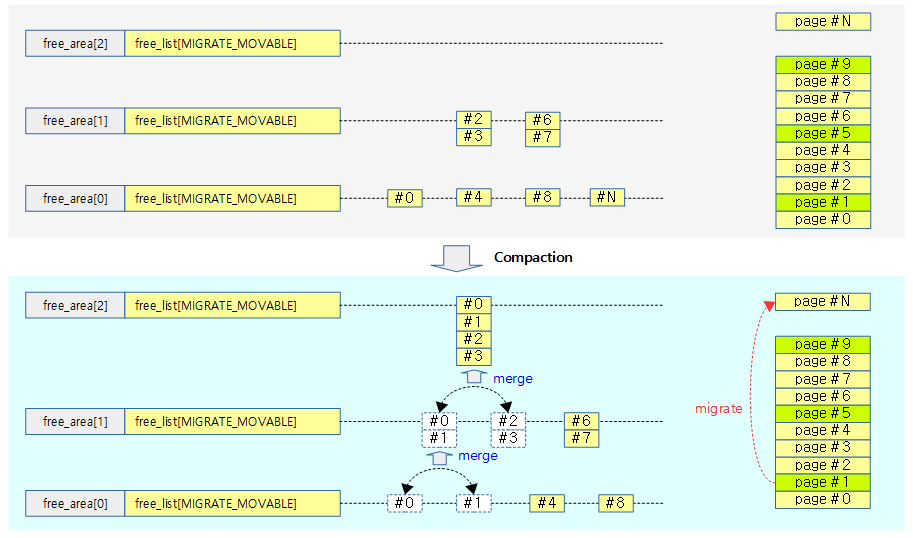
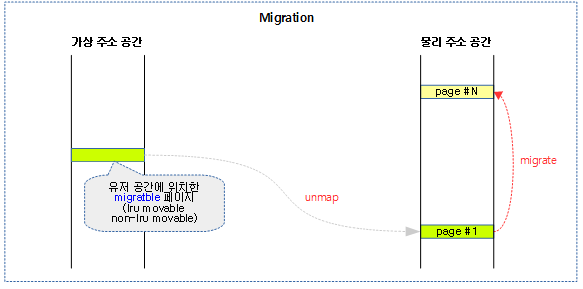
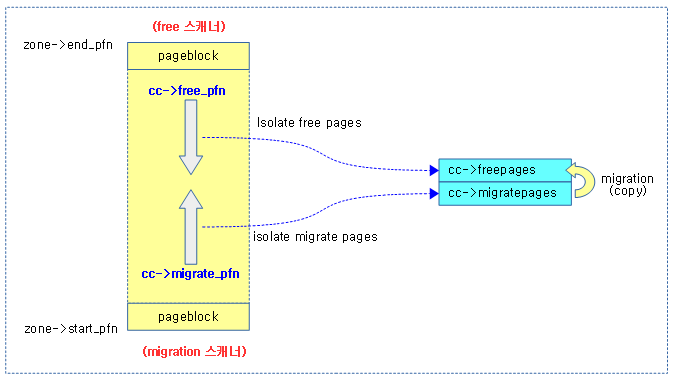
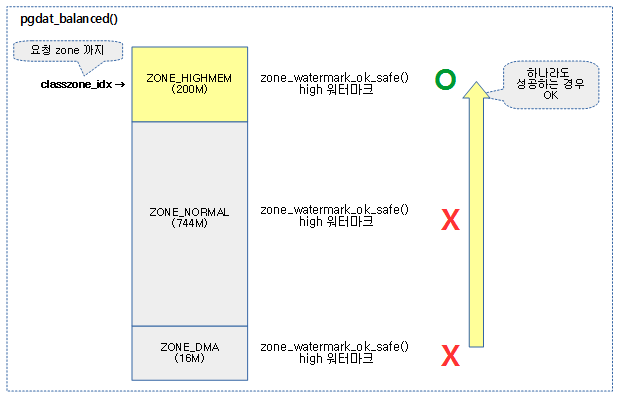
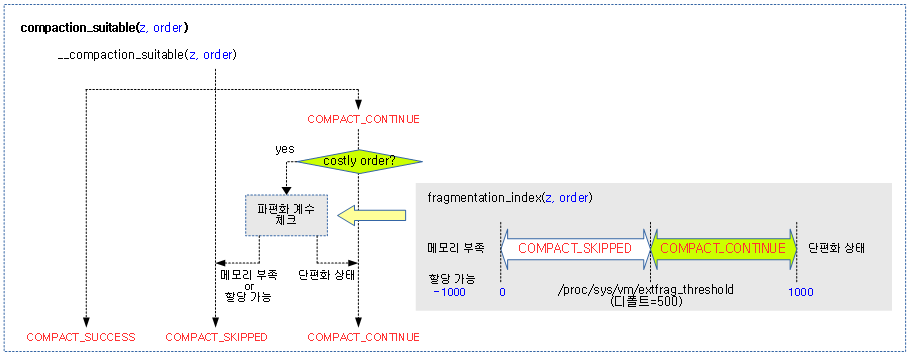
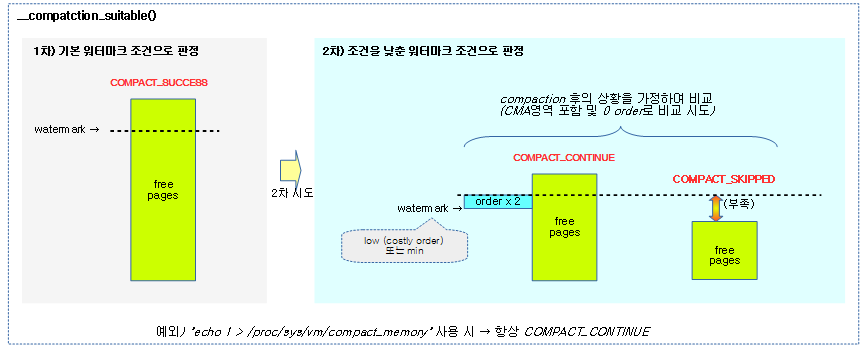
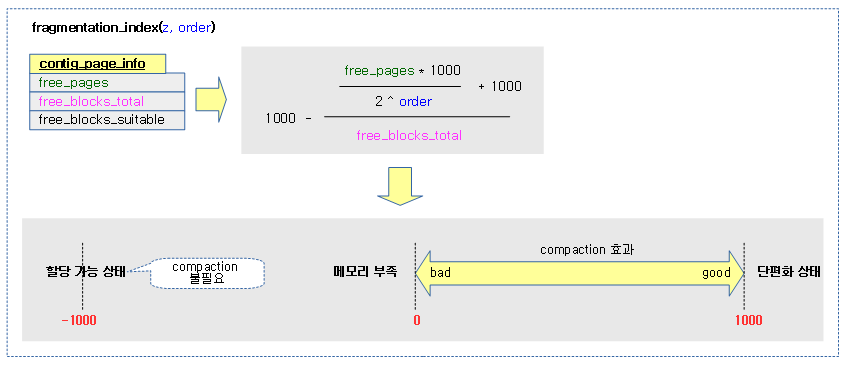
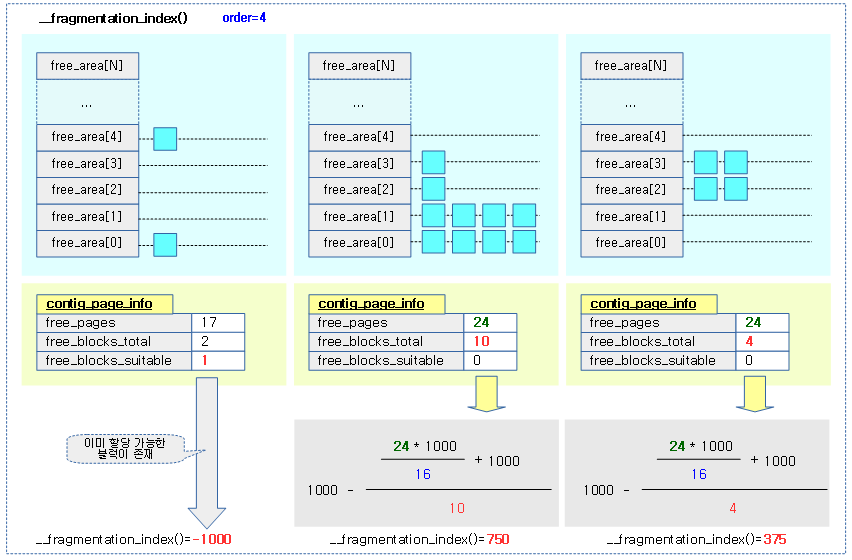
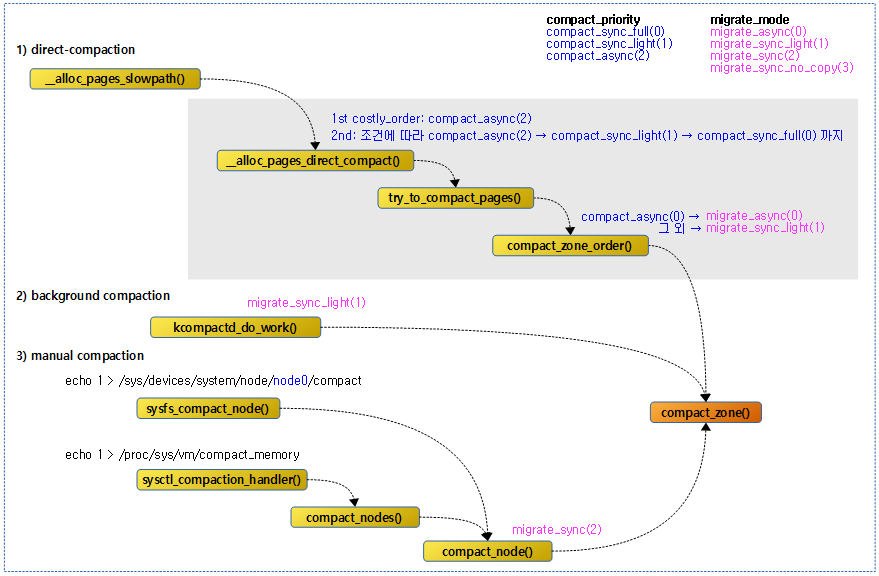
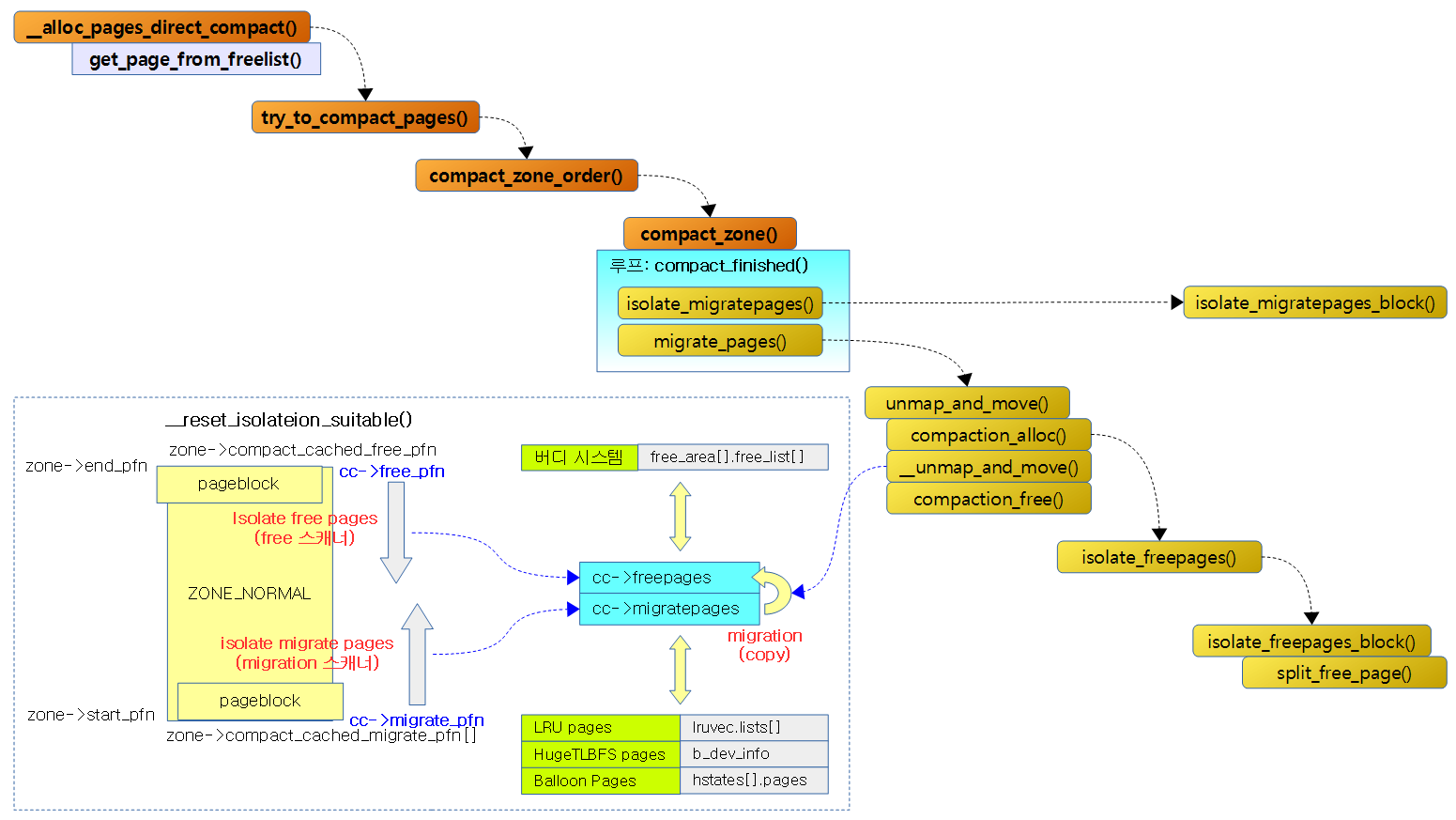

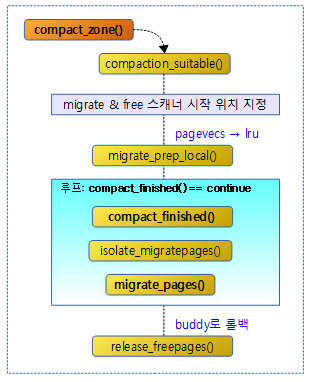
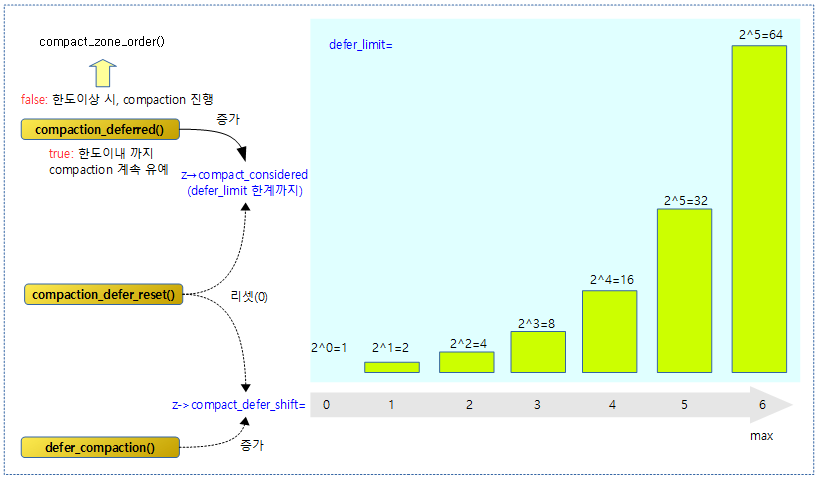
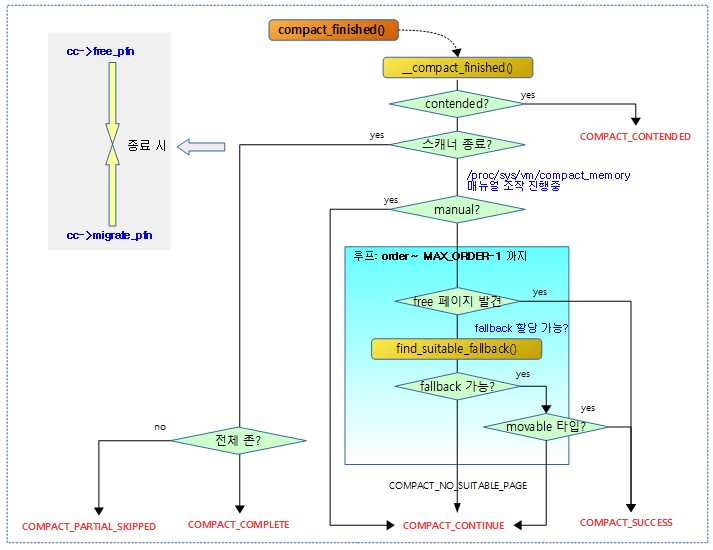
안녕하세요
위 __fragmentation_index() 예제 그림(fragmentation_index-1a-1)의 계산에 오타가 있습니다.
좌측에서 두번째 예
1000 – (1500+1000)/10 = 1000-250 =750
세번째 예
1000 – (1500+1000)/4 = 1000-625 =375
로 계산됩니다.
즉, 두번째 750이 세번째 375보다 1000에 더 가까우므로, compaction시 할당에 성공할 가능성이 세번째 보다 더 높습니다.
감사합니다.
안녕하세요? PETER님께서 말씀해주신 덕분에 오류가 있음을 확인했습니다.
그림을 다시 수정하였고, 오류가 있는 해석은 제거하였습니다.
오류를 찾아주셔서 감사합니다. 즐거운 성탄 맞이하시기 바랍니다 ^^
안녕하세요
“0에 가까울 수록 메모리 부족으로 compaction을 허용하지 않는것이 좋다.”
저는 이 부분도 이해가 잘 안됩니다. 메모리 부족이 free_pages 가 부족한 부분을 이야기 한다면
식에서 free_pages가 커야 0에 가깝게 됩니다.
항상 감사드립니다.
안녕하세요?
원하는 order 페이지의 할당이 불가능해서 compaction 여부를 판단해야 하는 지점입니다.
극단적으로 50M free 페이지가 있는데, 1M 메모리를 할당 못해 compaction을 해야 할 수 있습니다.
이 때에는 메모리 부족 여부를 보는 것이 아니라 얼마나 많이 흩어져 있는가에 초점을 맞춥니다.
그래서 같은 메모리 부족 상태라 하더라도 흩어져 있는 경우에는 모아서 compaction을 하는 것이 유용하다고 판단합니다.
먼저 free 페이지 수는 항상 free 블럭 수보다 크거나 같고,
차이가 클수록 단편화 계수가 커지며,
compaction 수행을 통해 흩어진 메모리를 모아 할당이 가능할 것이라 판단합니다.
단편화 계수는 다음과 같습니다.
0에 가까울 수록 -> 정말 메모리 부족으로 할당이 불가능하다
1000에 가까울 수록 -> 단편화 때문에 할당이 불가능하다.
감사합니다.
제가 ‘메모리 부족’이란 단어에 꽂혀서 아직 잘 이해가 안되네요. 이 단어의 의미를 전 free_pages 수를 가지고 판단하고
문영일님 말씀하신 의미는 좀 다른 것 같습니다. 2M (order 9) 블록을 할당하려는데 1M(order 8) 짜리 블록이
2개 있다면 compaction에 의해 이론적으로는 할당이 가능합니다. 이 경우 단편화계수는 0 이 됩니다.
말씀하신 정말 메모리 부족의 의미가 계속 혼돈이 오네요.
감사합니다.
아마 free 페이지 수를 변화시키면서 혼동이 오는 것 같아보입니다.
메모리 부족인 상황이면 이미 free 페이지 수는 작아져 있고,
이 free 페이지들이 얼마나 되는 free 블록으로 흩어져있는지 알아보는 기준으로 보셔야합니다.
예를 들어 1024 free_pages(4M)가 있고, 할당은 512(2M) pages를 할 때,
실패하여 compaction을 하려고 흩어져 있는 free 블럭수별로 단편화 계수를 알아보면 다음과 같습니다.
1000 – (1024 * 1000 / 512 + 1000) / 3 = 0
1000 – (1024 * 1000 / 512 + 1000) / 4 = 250
1000 – (1024 * 1000 / 512 + 1000) / 5 = 400
1000 – (1024 * 1000 / 512 + 1000) / 6 = 500
1000 – (1024 * 1000 / 512 + 1000) / 7 = 571
1000 – (1024 * 1000 / 512 + 1000) / 10 = 700
1000 – (1024 * 1000 / 512 + 1000) / 30 = 900
1000 – (1024 * 1000 / 512 + 1000) / 300 = 970
부족한 free 페이지의 특정량을 기준으로 free 블럭만 변화를 시켜야 상대적인 단편화 계수를 비교할 수 있습니다.
(참고로 compaction을 해도 free 페이지는 변화하지 않습니다. 블럭 수만 변화합니다.)
단편화 계수가 큰 경우 compaction을 시도하고, 그래도 안되면 별도의 메모리 회수(reclaim)를 통해 free 페이지를 확보합니다.
메리크리스마스!
아 제가 뭔가 이해력이 부족한가 봅니다. 위의 예에서 단편화 계수가 0 이나 970 이나 남아있는 free_pages는 모두 4M로
똑같은 메모리가 남았을 때 기준으로 계산한건데 왜 0인 쪽만 메모리 부족이라고 표현하시는 거지 한겁니다.
단편화 계수가 작아서 compaction을 하지 않는 쪽을 메모리 부족이라고 분류하신 것 같은데 이브날 너무 괴롭힌 것 같기도 하고.
연말 잘 보내시고 건강하세요 ~
__fragmentation_index() 함수안에 다음과 같은 주석이 있습니다.
/** Index is between 0 and 1 so return within 3 decimal places
*
* 0 => allocation would fail due to lack of memory
* 1 => allocation would fail due to fragmentation
*/
위의 주석 설명문은 다음과 같이 단순하게 설명하였습니다.
0 => 메모리 부족으로 할당이 실패할 수 있다.
1 => 단편화로 인해 할당이 실패할 수 있다.
다만 위의 주석 설명문을 조금 더 풀어 설명드리면,
0 => 메모리가 부족한 상태이고, 단편화 해결과 관련 없이 요청한 페이지의 확보가 실패할 수 있다.
1 => 메모리가 부족한 상태이고, 단편화로 인해 요청한 페이지의 확보가 실패할 수 있다. 즉 단편화로 인해 흩어진 메모리를 모으는데 성공하면 요청한 페이지의 확보가 성공할 수 있다.
용범님도 연말 잘 보내시길 바랍니다.
소스 내에서도 0에 가까운 쪽을 lack of memory 로 표현하였군요.
감사합니다.
네. 맞습니다.
감사합니다. ^^